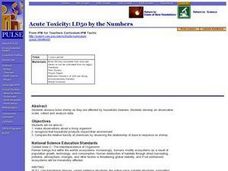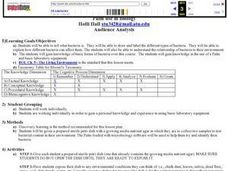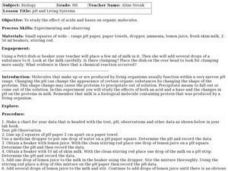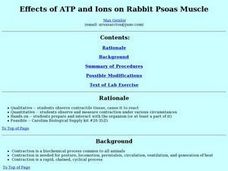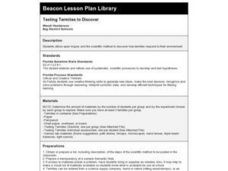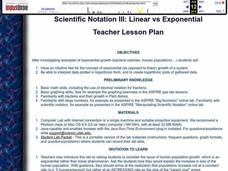Curated OER
Acute Toxicity: LD50 by the Numbers
Students observe brine shrimp as they are affected by household cleaners, develop observation scale, collect and analyze data, and discuss how household products and pesticides negatively impact environment.
Curated OER
Testing for Conductivity
Learners test the conductivity of selected liquids and solids. They test the circuit by touching the two free ends of the wires together and add salt little by little recording the data after each addition. Finally, students predict...
Curated OER
Palm Use in Biology
Students view bacteria through a microscope. They draw and label the bacteria using microbiology software loaded onto their Palms.
Curated OER
Temperature and Brine Shrimp Eggs
Students determine the optimal temperature at which brine shrimp eggs hatch and develop. They evaluate the changes, if any, which occur in a brine shrimp culture at various temperatures.
Curated OER
Observing the Development of Drosophila in Apple Juice Agar
Students observe the development of the Drosophila fly. They observe the first two stages - the egg and the 3 larval instars. They observe the culture every day for 8 days using a stereo dissecting microscope.
Curated OER
Is it Alive?
Students watch a demonstration using Duco glue and water and try to determine if the "monster" shown is alive. After the demonstration, they discuss what characteristics make an organism "alive". They participate in a card sorting...
Curated OER
Learning By Bees
High schoolers investigate learning by bees as related to vision and foraging behavior. The experiment is done outdoors where bees are foraging for food. They make their observations and record their data which is shared with the class.
Curated OER
pH Change and Brine Shrimp eggs
Students determine if brine shrimp eggs hatch and develop more readily in an environment which has an acid or a basic pH. They evaluate the pH level which is optimal for the hatching and development of brine
shrimp.
Curated OER
Determination of Overall Water Quality Using a Quantitative Macroinvertebrate Survey
Students examine water samples from a local stream. They identify various types of macroinvertebrates found in that water ecosystem and perform a quantitative macroinvertebrate survey to determine the stream's water quality.
Curated OER
Animals Between the Sand Grains -- Meiofauna
Middle schoolers begin the lesson by collecting sand at low tide from a local beach. They place each specimen on trays with a tiny amount of seawater. After a week, they can observe the meiofauna present in the sand through a microscope....
Curated OER
Make and Use a Plankton Net
Students make simple plankton nets and use them to collect and identify common forms of plankton. They identify and interpret plankton, as seen under a microscope, whether there was more zooplankton or phytoplankton. Finally, students...
Curated OER
A Cosmic Cafeteria
Young scholars indentify and differentiate between transit and surface food systems. Students measure energy that is released by various foods. Young scholars compare and contrast cooking with solar energy on earth and what they might...
Curated OER
Effects of pH on Organic Molecules
Young scholars investigate the effects of an acid and a base on the structure of milk protein. They observe the changes to droplets of milk when adding ammonia and lemon juice and relate the changes to old, curdled milk. An extension...
Curated OER
Comparative Embryology Using Japanese Medaka Fish
Students conduct an experiment to control the breeding of Japanese Medaka fish. They collect the fertilized eggs and view and record the fish's embryological development daily to compare the stages to human development.
Curated OER
Effects of ATP and Ions on Rabbit Psoas Muscle
Students prepare single strands of muscle cell. They microscopically examine muscle cells and identify bands of darker and lighter proteins. They predict, observe, describe and quantify the effects of ions and ATP.
Curated OER
Floating Candles
Students observe a combustion reaction and deduce the components necessary for the reaction to occur. They also identify and interpret the relationship between pressure, volume, and number of molecules for gasses. Finally, students use...
Curated OER
Plant And Animal Cells
Students identify parts of plant and animal cells and describe the functions of each part. They distinguish between plant and animal cells. After a lecture/demo, students perform experiments which help them construct models of plant and...
Curated OER
Testing Termites to Discover
Students design an experiment to discover how termites respond to their environment.
Curated OER
Does a change in pH affect the growth and survival rate of aquatic plants?
Students determine if changes in pH affect the growth and survival rates of aquatic plants. They evaluate the optimal pH levels for the growth of aquatic plants.
Curated OER
Water Quality and Temperature
Students evaluate the effects of temperature changes on the metabolic rate of a clam. Conclusion questions are addressed which help students to process and articulate their experiences.
Curated OER
DOES A FLUCTUATION IN TEMPERATURE IFFECT THE GROWTH AND SURVIVAL RATE OF AQUATIC PLANTS?
High schoolers determine if different temperatures effect the growth and survival rates of aquatic plants and evaluate the optimal temperature for the growth of aquatic plants.
Curated OER
Decomposers at Work!
Students design and conduct investigations that illustrate the process of decomposition. After a lecture/demo, students simulate the process of soil composting in the classroom. They closely chart the decomposition of their soil.
Curated OER
Scientific Notation III: Linear vs Exponential
Learners examine the differences in exponential growth and linear growth of a system. They interpret data on graphs and develop their own charts. They answer discussion questions as well.
Curated OER
Superbugs
Students research deep sea communities and discover strategies for combating antimicrobial resistance and write reports on it. They consider overprescription and prophylactic uses of antibiotics as causes for their ineffectiveness.


